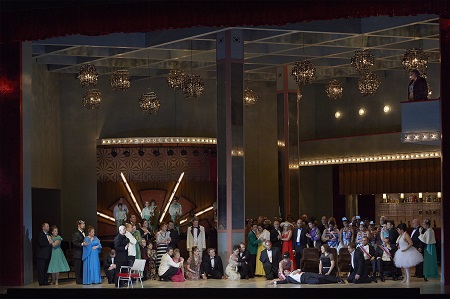
Stunning voices and exceptional talent take the stage in A Masked Ball at Toronto’s Four Seasons
Since the use of sound is so central to our expectations of an opera, Jossi Wieler and Sergio’s choice to use silence at the opening of COC’s 2013-2014 production of Un Ballo in Maschera (A Masked Ball) by Giuseppe Verdi was arresting. It is hard to say exactly how long the page Oscar, played by Simone Osborne, took a leisurely stroll around the stage before the opening strains of the overture began; the silence was pregnant with possibility and anticipation.
Drawing on the ongoing social fascination with the radical social change that took place during this era, this production is set during the 1960s. Frequently, the transposition of a historical work into a more modern setting involves a compromise wherein some of the glamour and opulence that can be achieved in a period set is lost. Not so in this production. From the red lamé curtain to the disco balls that appeared to be made of giant sequins, this production certainly did not lack for glitz and glamour. The costumes during the ball scene were the epitome of colourful, over-the-top elegance. I felt the choice of the 1960s was effective, after all, this was an era where traditional sexual mores were being called into question. My companion however, did not agree. She felt the setting and the content were incongruous.
In addition to this production’s lavish use of spectacle, it is also a feat of storytelling. The cast brought a marvelous passion and intensity to their roles, thereby enthralling the listener in a relatively straightforward story. Adrianne Pieczonka, who sang the role Amelia, is no stranger to a leading role with the COC. Since I undoubtedly waxed poetic about Ms. Pieczonka’s voice in my review of the COC’s most recent production of Tosca, I will instead highlight the sincerity and vulnerability that she brought to her interpretation of the role. It was impossible not to empathize with Amelia’s plight.
It was clear that Simone Osborne has a superb grasp of the nuances of this opera and Oscar’s role. She brought a playfulness, levity, and sensuality to her interpretation that perfectly captured the comedic relief function of this character. Now, perhaps this had something to do with the potency of the brunch cocktail I had prior to the show, but I completely missed the boat on the fact that the directors in this production have chosen not to play Oscar as a pants role. Pants roles are those roles in opera where mezzo-sopranos play men. In traditional productions of this opera, comedic relief is effected during the ball by having Oscar come out in drag. This is not hilarious because Oscar is a boy dressed as a girl. It is hilarious because Oscar is a girl dressed as a boy dressed as a girl. While, Ms. Osborne’s ball costume undoubtedly got a hearty chuckle from the audience, I felt this choice was less funny than the convention. Downplaying comedy during this scene preserves more of the dramatic tension, although, being a great lover of nonsense, I was ever so slightly disappointed.
Elena Manistina was also spine-tingling as the foreboding old fortune-teller, Ulrica. Her voice possessed a blend of darkness and edge that makes her a perfect cast for the archetypal role of the wicked witch in opera. In a genre where our villains and our heroes are generally very black and white, Roland Wood injects a substantial and appropriate infusion of gray in his interpretation of Renato, the foil of the show’s romantic lead, Riccardo (Dimitri Pittas).
Mr. Pittas was charming as the lovable and trusting ingenue. His singing style is fresh and free and seems to immediately put the listener at ease. Mr. Pittas made me like him and I wanted a happy ending for his character, even though I knew there was no hope of getting one.
My companion and I were also very impressed by the orchestra. In the context of a timeless story and tried and true compositional devices, the orchestra elicited the full range of colour and texture that is expressed in Verdi’s profoundly emotional score.
In addition to a feast for the eyes and ears, this production is also a dramatic achievement that manages to make the listener feel as though they are hearing an old story for the first time.
Details:
- Un Ballo in Maschera (A Masked Ball) is playing until February 22 at Four Seasons Centre for the Performing Arts (145 Queen Street West)
- Show times are 7:30 PM on February 5, 8, 11, 14 & 20 with additional matinees on February 16 at 2 PM and February 22 at 4:30 PM.
- Ticket prices range from $45 – $365. Patrons under 30 can purchase tickets for $22 or $35 here.
- Tickets are available online, or through the box office at 416-363-8231 (long distance 1-800-250-4653)

Masked Ball and Don Carlo are two of my favourite operas by Verdi. This production of Masked Ball bore little resemblance to the opera I know and love. Nor do I believe Verdi would have been pleased.
“Incongruous?” Absolutely. I actually love seeing modern 20th century operas more than I do the old war horses. However, many directors are trying to turn all operas into 20th century operas, as is the case here. It did not serve the opera or the composer well. Directors and designers should trust the materials more, and critics should call them out for attempting to introduce extraneous elements, just to make their production “different”. I would have enjoyed the production more if I had closed my eyes and just listened.
Robert